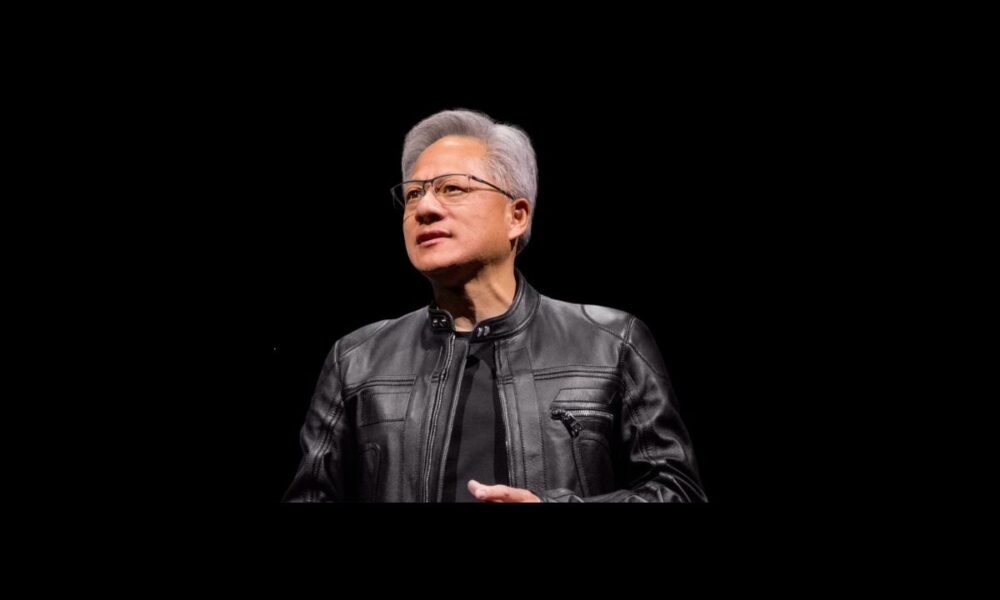Nvidia, a technology company headquartered in Santa Clara, California, will continue sponsoring foreign workers through the H-1B visa program, despite President Trump’s new policy increasing costs for employers.
In an internal message obtained by Business Insider, CEO Jensen Huang told staff that the company will “continue to sponsor H-1B applicants and cover all associated fees,” following Trump’s September executive order imposing a $100,000 fee on each new application.
The new $100,000 fee reportedly applies only to most new H-1B visa applications, not existing ones.
“As one of many immigrants at Nvidia, I know that the opportunities we’ve found in America have profoundly shaped our lives,” Huang reportedly wrote. “And the miracle of Nvidia — built by all of you, and by brilliant colleagues around the world — would not be possible without immigration.”
Huang added that “legal immigration remains essential to ensuring the U.S. continues to lead in technology and ideas,” calling the administration’s recent changes a reaffirmation of that principle.
The announcement comes amid a broader political debate over the H-1B visa system, which allows U.S. companies to hire foreign workers in specialized fields such as computer science and engineering.
Trump and Vice President JD Vance have argued that the program has been abused to undercut domestic labor, while industry leaders claim it is vital to maintaining U.S. competitiveness in technology, The Dallas Express previously reported.
Nvidia has employed 1,473 H-1B workers since 2020, making it one of the largest visa sponsors in the tech industry, according to U.S. Citizenship and Immigration Services data.
The privately run H1B Salary Database, which catalogs Labor Condition Applications (LCAs) filed with the Department of Labor, a key early step toward obtaining an H-1B visa, does not currently show new filings by Nvidia since Trump announced the new fee policy. However, the absence of filings may reflect the ongoing government shutdown, which has left the Department of Labor unable to process new paperwork, DX reported.
In 2025, Nvidia submitted LCAs for positions such as Architect, Analyst, and Business Systems Senior Staff in Texas, suggesting intent to expand its H-1B workforce. The salary database does not show whether those applications were approved.
The Dallas Express reported on September 30 that the Department of Labor’s Office of Foreign Labor Certification stopped processing all applications due to the shutdown, halting LCAs, prevailing wage determinations, and green card sponsorships. The American Immigration Lawyers Association warned that employers could be left unable to meet statutory deadlines or hire new foreign workers.
The timing also coincides with an uptick in unemployment among recent U.S. graduates, including those in tech-related fields. National data cited by the Federal Reserve Bank of New York indicate that unemployment among computer engineers is 7.5%, while computer science graduates face a 6.1% unemployment rate and 16.5% underemployment.
The Department for Professional Employees’ 2025 fact sheet stated “Employers can and do underpay H-1B workers,” noting that well over half of H-1B roles in FY2019 were paid at the lowest two federally permissible wage levels.
In June, DX reported that nationalist-populist author Ryan James Girdusky warned Trump that continued reliance on the H-1B program could alienate working-class voters, especially as automation replaces white-collar entry-level jobs.
“Automate their jobs out of existence, replace the few remaining with H-1B workers, and offer them no plan on how to move their lives forward,” Girdusky wrote, cautioning of a potential grim future for the MAGA movement if these issues were not addressed.
Huang, who has both praised and critiqued Trump’s policy, previously told CNBC that he was “glad” to see the executive order, calling it a “great start,” though he later said the $100,000 price tag “probably sets the bar a little too high.”
Huang acknowledged that while Nvidia can afford the new costs, smaller startups might struggle. “The $100,000 fees could have a more significant impact on cash-strapped startups than well-funded tech companies,” Huang said in an interview with the BG2 podcast.
At least for now, Nvidia says it is forging ahead. “We will continue to sponsor H-1B applicants and cover all associated fees,” Huang told its employees.


